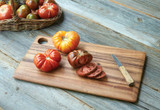14.5 x 8 in. board plus 6 in. handle. 0.5 in. thick.
How to Care for Unfinished Wood Utensils
Oil natural wood utensils on a regular basis. We recommend it monthly or even more frequently.
We recommend mineral oil. Food grade mineral oil is tasteless and odorless. It does not get sticky and does not become rancid with time. It does not stain wood. It does not harden and keeps the wood pliable enough and clean enough for use in all kinds of food preparation.
Rub oil with a cloth or paper towel in generous amounts, until it no longer absorbs. The wood and the oil should be at room temperature before starting. For very dry utensils, you should repeat the process after 6-8 hours, and again, if necessary, until the oil is no longer being absorbed after that time. Then use a cloth or paper towel to wipe off any excess oil that remains on the surface.
Wash your properly oiled wooden utensils without worry. Do not soak wood utensils soak, and do not put them in a dishwasher. Keep food from drying hard by cleaning utensils right away. Most utensils can simply be wiped clean with a cloth or paper towel. Use soap and hot water for spoons, spatulas, and other utensils that come in contact with raw foods, like meat and egg products.
If you used soap, you might need to re-oil after drying. Soap removes oils, and should only be used when necessary, such as with utensils that come in contact with potentially hazard-posing raw foods. Other times, rub with a lemon wedge after drying.
Towel dry wooden boards and utensils thoroughly after washing. Wood dries faster than plastic, and will thus be less likely to harbor bacteria on its surface. Quickly drying keeps water from soaking into and damaging the board, especially if it's in need of a good coating of oil. Rub a wedge of lemon on the wood to help keep it free from bacteria and other germs. Makes it smell good, too.
Store in a dry location, at room temperature, away from hot, cold and humid areas. Excessive heat dries the surface oil, and causes warping, splitting, and cracking. Extreme cold temperatures are very dry, draw the moisture from the wood, and cause warping, splitting, and cracking. Moisture that stays on wood causes it to split from expansion. Never subject wooden utensils to temperature extremes. Like us, wood needs a bit of time to warm up when coming in from the cold, and it doesn't like touching very hot pots, either.
Cutting boards should be cleaned thoroughly after use. Note also, boards should never be used interchangeably with uncooked meat (including poultry and fish) and other foods (like bread, salads, etc.). This is important in order to avoid possible cross contamination from pathogens found in uncooked meat products. The USDA recommends that you wash wooden cutting boards and utensils used with uncooked meat products (including fish and poultry) with hot, soapy water, then rinse and dry. Before first use, make sure your cutting board is well oiled.
Warranties on wood products cover their materials, workmanship, and merchantability. Warranties do not cover cracking or splitting that occurs when wood has been soaked, when it has dried from not being oiled regularly, and when it has been subjected to intense changes in temperature and humidity.
If a wood board or bowl is well maintained (washed with no soaking nor dishwasher after use and dried immediately, kept oiled, not subjected to unusual temperatures), it is simply not likely to warp or crack.
A dry wooden board or bowl that has NOT been maintained will eventually crack along the grain of the wood. If subjected to the dishwasher and other temperature extremes or soaking in water, it might also crack at the glue joints by weakened glue bonds. The glue joints are supposed to create a stronger bond than the wood fibers.
Reminder... When you notice the wooden becoming dry (it will lighten in color), it's time to re-oil. Better yet, just make it a point to re-oil on a regular basis. That old wood spoon from grandma will then last you just about forever, or until it wears out, whichever comes first.

